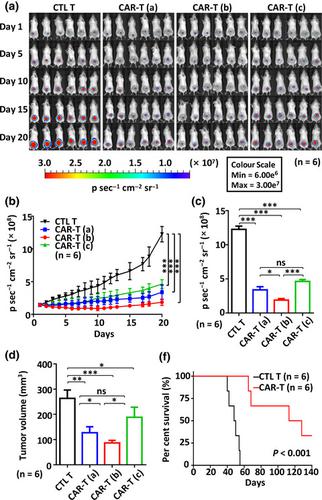当前位置:
X-MOL 学术
›
Clin. Transl. Immunol.
›
论文详情
Our official English website, www.x-mol.net, welcomes your feedback! (Note: you will need to create a separate account there.)
EGFR-targeted CAR-T cells are potent and specific in suppressing triple-negative breast cancer both in vitro and in vivo.
Clinical & Translational Immunology ( IF 5.8 ) Pub Date : 2020-05-03 , DOI: 10.1002/cti2.1135 Lin Xia 1, 2 , Zao-Zao Zheng 1 , Jun-Yi Liu 2 , Yu-Jie Chen 1 , Jian-Cheng Ding 1 , Ning-Shao Xia 2 , Wen-Xin Luo 2 , Wen Liu 1, 2, 3
Clinical & Translational Immunology ( IF 5.8 ) Pub Date : 2020-05-03 , DOI: 10.1002/cti2.1135 Lin Xia 1, 2 , Zao-Zao Zheng 1 , Jun-Yi Liu 2 , Yu-Jie Chen 1 , Jian-Cheng Ding 1 , Ning-Shao Xia 2 , Wen-Xin Luo 2 , Wen Liu 1, 2, 3
Affiliation

|
Objectives
Triple-negative breast cancer (TNBC) is well known for its strong invasiveness, rapid recurrence and poor prognosis. Immunotherapy, including chimeric antigen receptor-modified T (CAR-T) cells, has emerged as a promising tool to treat TNBC. The identification of a specific target tumor antigen and the design of an effective CAR are among the many challenges of CAR-T therapy.
Methods
We reported that epidermal growth factor receptor (EGFR) is highly expressed in TNBC and consequently designed an optimal third generation of CAR targeting EGFR. The efficacy of primary T lymphocytes infected with EGFR CAR lentivirus (EGFR CAR-T) against TNBC was evaluated both in vitro and in vivo. The signalling pathways activated in tumor and EGFR CAR-T cells were revealed by RNA sequencing analysis.
Results
Third-generation EGFR CAR-T cells exerted potent and specific suppression of TNBC cell growth in vitro, whereas limited cytotoxicity was observed towards normal breast epithelial cells or oestrogen receptor-positive breast cancer cells. This capability was further demonstrated in vivo in a xenograft mouse model, with minimal off-tumor cytotoxicity. Mechanistically, in vitro stimulation with TNBC cells induced the expansion of naïve-associated EGFR CAR-T cells and enhanced their persistence. Furthermore, EGFR CAR-T cells activated the interferon γ, granzyme-perforin-PARP and Fas-FADD-caspase signalling pathways in TNBC cells.
Conclusion
We demonstrate that EGFR is a relevant immunotherapeutic target in TNBC, and EGFR CAR-T exhibits potent and specific antitumor activity against TNBC, suggesting the potential of this third-generation EGFR CAR-T as an immunotherapy tool to treat TNBC in the clinic.
中文翻译:

靶向 EGFR 的 CAR-T 细胞在体外和体内均能有效且特异地抑制三阴性乳腺癌。
目的 三阴性乳腺癌(TNBC)以其侵袭性强、复发快、预后差而著称。免疫疗法,包括嵌合抗原受体修饰的 T (CAR-T) 细胞,已成为治疗 TNBC 的有前途的工具。识别特定的靶肿瘤抗原和设计有效的 CAR 是 CAR-T 疗法的众多挑战之一。方法 我们报道了表皮生长因子受体(EGFR)在 TNBC 中高表达,因此设计了针对 EGFR 的最佳第三代 CAR。在体外和体内评估了感染 EGFR CAR 慢病毒 (EGFR CAR-T) 的原代 T 淋巴细胞对 TNBC 的疗效。通过 RNA 测序分析揭示了在肿瘤和 EGFR CAR-T 细胞中激活的信号通路。结果 第三代 EGFR CAR-T 细胞在体外对 TNBC 细胞生长发挥了有效和特异性的抑制作用,而对正常乳腺上皮细胞或雌激素受体阳性乳腺癌细胞的细胞毒性有限。这种能力在异种移植小鼠模型的体内得到了进一步证明,具有最小的肿瘤外细胞毒性。从机制上讲,TNBC 细胞的体外刺激诱导了幼稚相关 EGFR CAR-T 细胞的扩增并增强了它们的持久性。此外,EGFR CAR-T 细胞激活了 TNBC 细胞中的干扰素 γ、颗粒酶-穿孔素-PARP 和 Fas-FADD-caspase 信号通路。结论 我们证明 EGFR 是 TNBC 的相关免疫治疗靶点,EGFR CAR-T 对 TNBC 表现出强效和特异性抗肿瘤活性
更新日期:2020-05-03
中文翻译:

靶向 EGFR 的 CAR-T 细胞在体外和体内均能有效且特异地抑制三阴性乳腺癌。
目的 三阴性乳腺癌(TNBC)以其侵袭性强、复发快、预后差而著称。免疫疗法,包括嵌合抗原受体修饰的 T (CAR-T) 细胞,已成为治疗 TNBC 的有前途的工具。识别特定的靶肿瘤抗原和设计有效的 CAR 是 CAR-T 疗法的众多挑战之一。方法 我们报道了表皮生长因子受体(EGFR)在 TNBC 中高表达,因此设计了针对 EGFR 的最佳第三代 CAR。在体外和体内评估了感染 EGFR CAR 慢病毒 (EGFR CAR-T) 的原代 T 淋巴细胞对 TNBC 的疗效。通过 RNA 测序分析揭示了在肿瘤和 EGFR CAR-T 细胞中激活的信号通路。结果 第三代 EGFR CAR-T 细胞在体外对 TNBC 细胞生长发挥了有效和特异性的抑制作用,而对正常乳腺上皮细胞或雌激素受体阳性乳腺癌细胞的细胞毒性有限。这种能力在异种移植小鼠模型的体内得到了进一步证明,具有最小的肿瘤外细胞毒性。从机制上讲,TNBC 细胞的体外刺激诱导了幼稚相关 EGFR CAR-T 细胞的扩增并增强了它们的持久性。此外,EGFR CAR-T 细胞激活了 TNBC 细胞中的干扰素 γ、颗粒酶-穿孔素-PARP 和 Fas-FADD-caspase 信号通路。结论 我们证明 EGFR 是 TNBC 的相关免疫治疗靶点,EGFR CAR-T 对 TNBC 表现出强效和特异性抗肿瘤活性


























 京公网安备 11010802027423号
京公网安备 11010802027423号